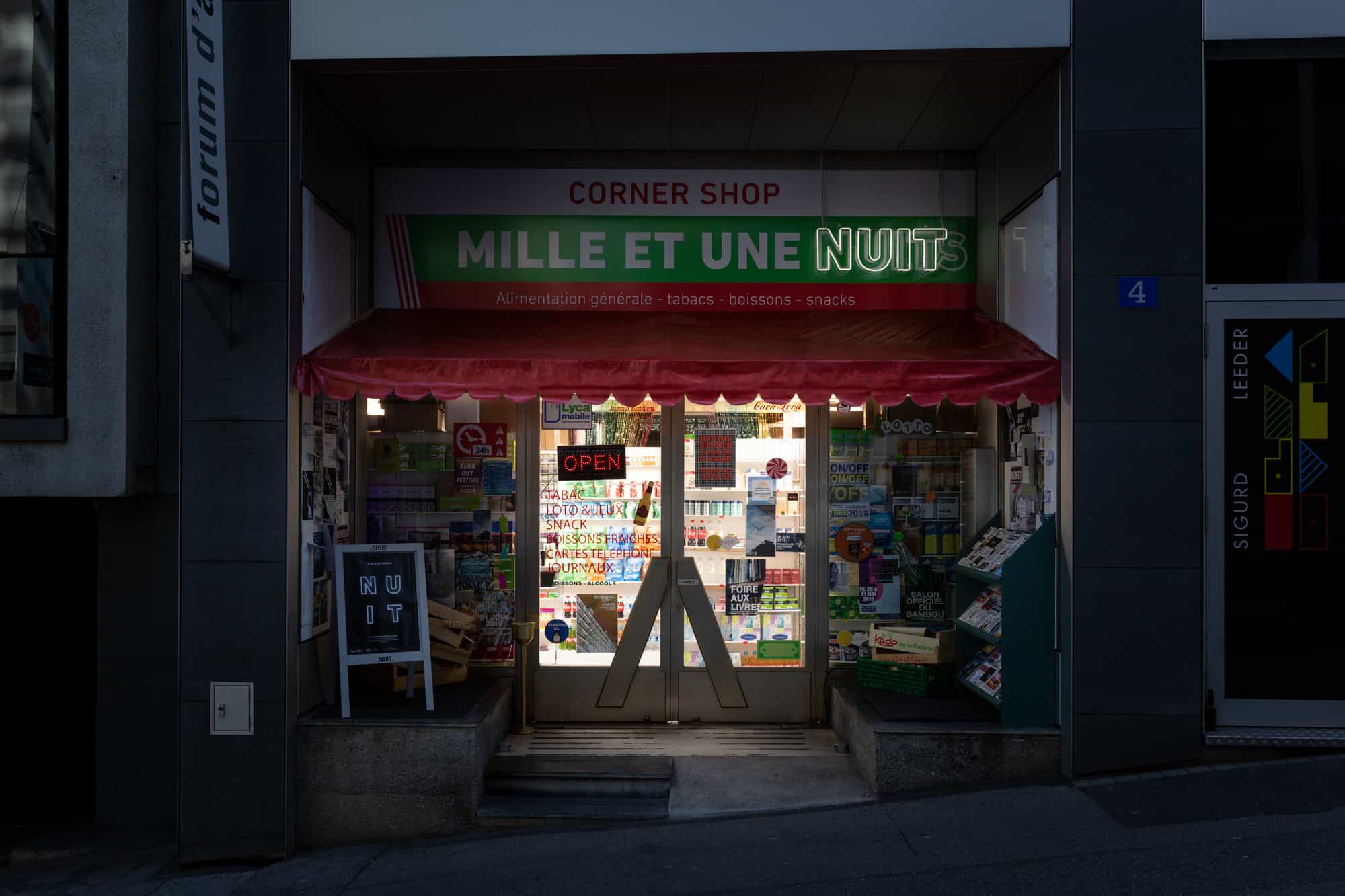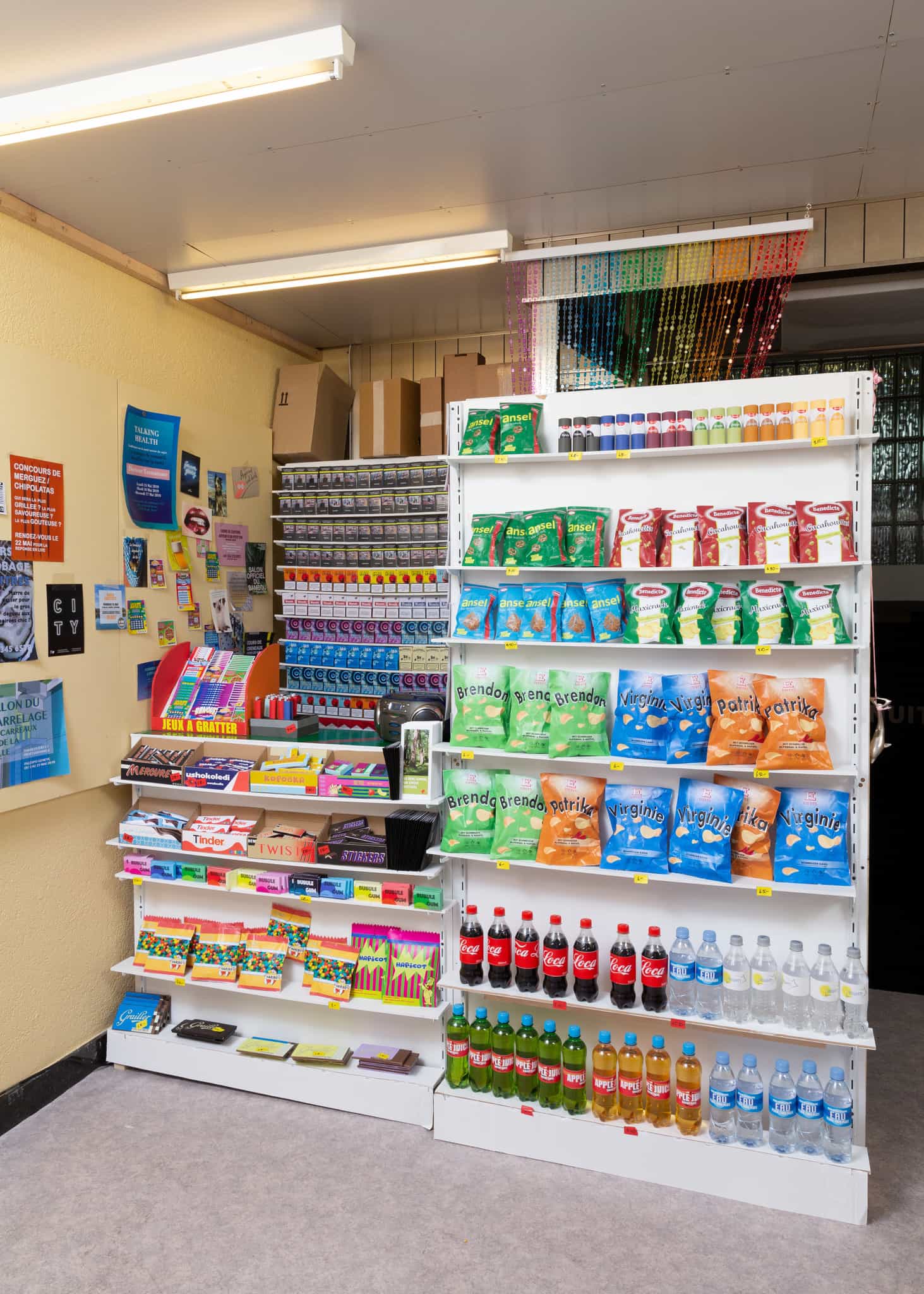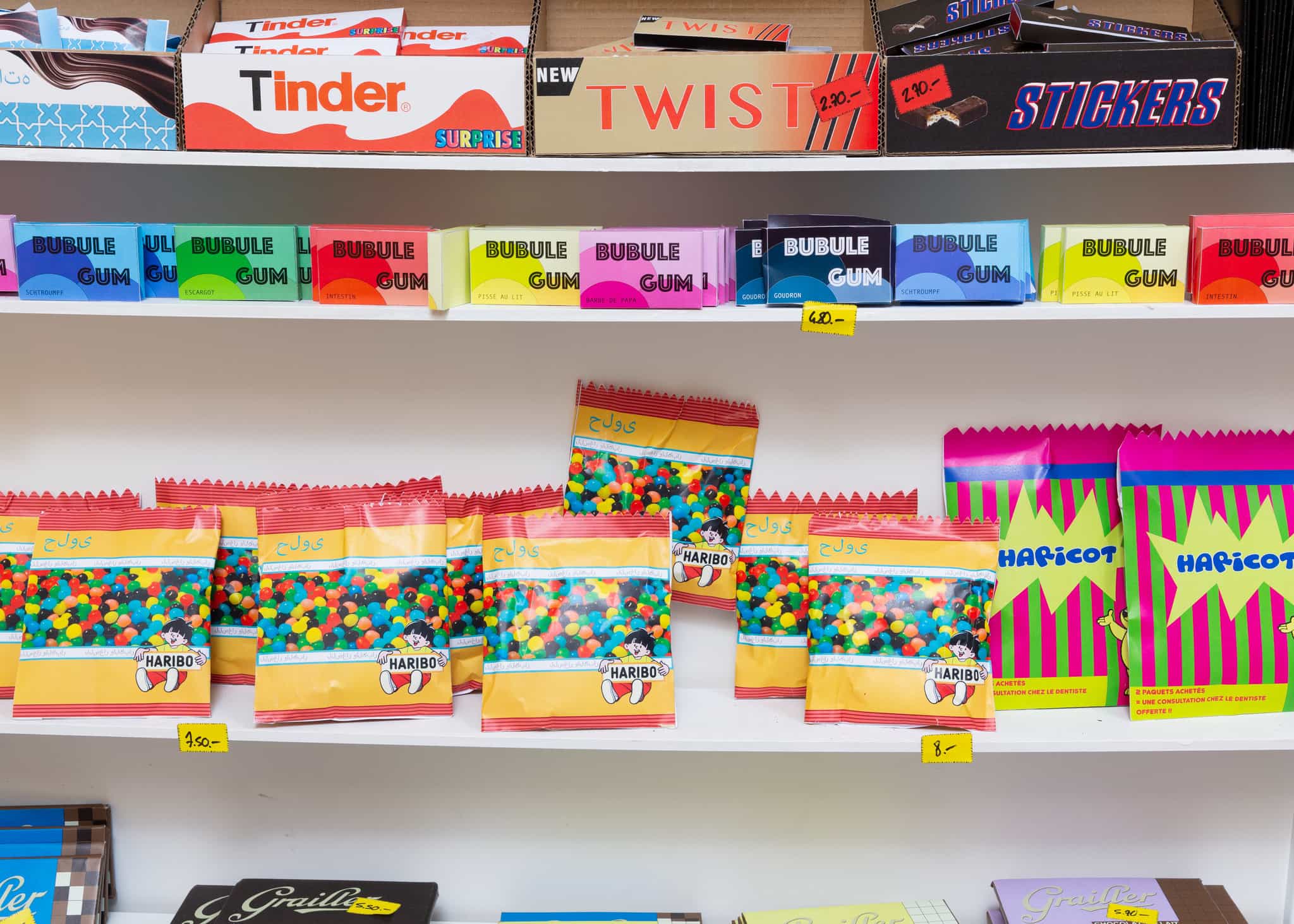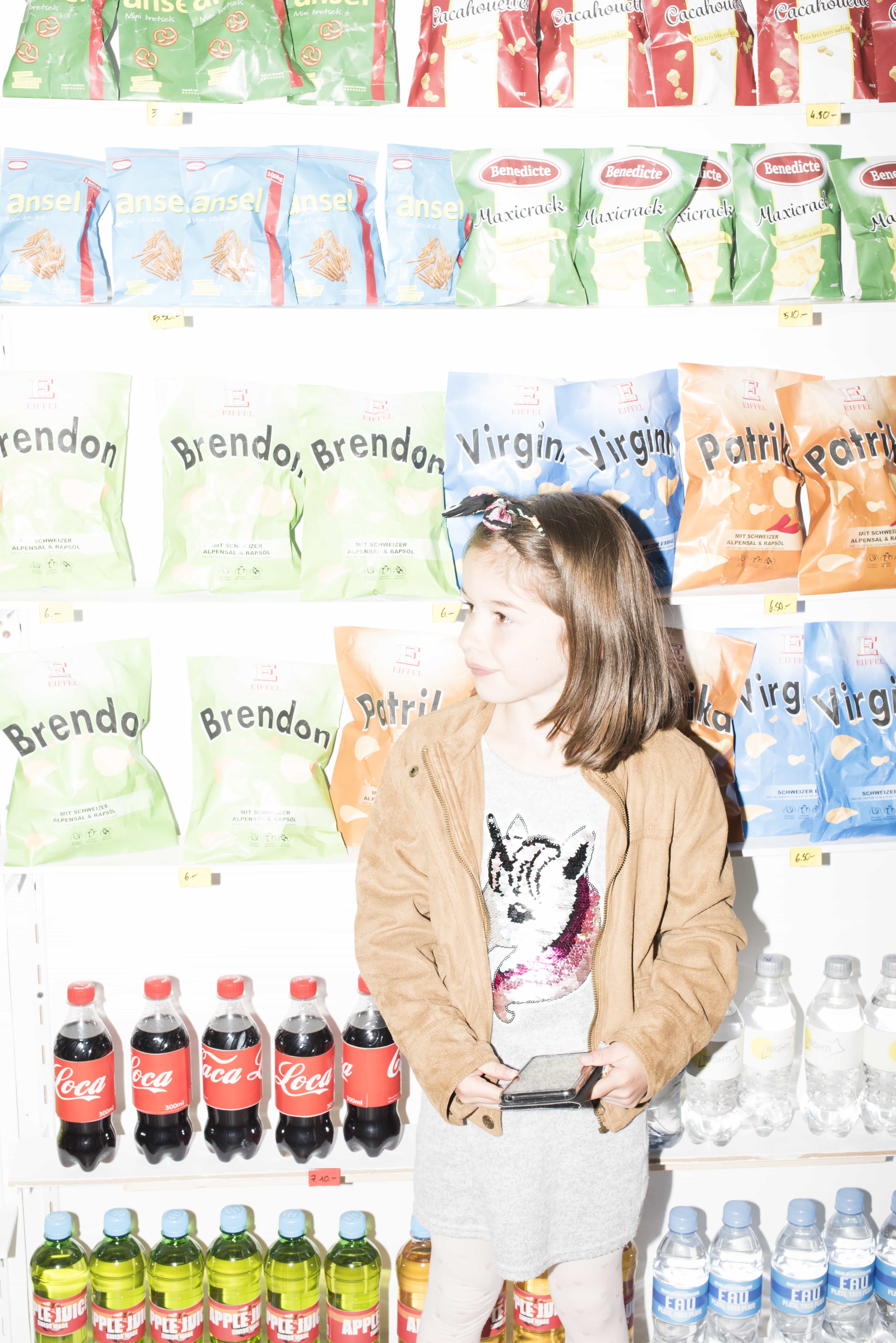A corner shop installation, followed by a conversation between Sukhdev Sandhu and Martin Kohout
09.05.2019, F’AR Lausanne
CORNER SHOP belongs to a series of events from the project SCÈNES DE NUIT, that presents five nocturnal encounters exploring the role of night in the construction of contemporary cities and societies. The exhibition seeks to examine and reflect upon the spaces, activities and media unfolded in night culture, and uses evening events and ephemeral scenography as the main display platform. The scenography was developed by students of HEAD-Genève’s Bachelor in Interior Architecture
The corner shop is defined as a multifaceted space that is open both during the day and throughout the night. It’s an iconic place that connects the inhabitants of the same neighbourhood physically and psychologically. Present in all major cities, it is identified by its highly codified visual identity and signage, through elements such as the artificial light of the “open” signs, the mix of items for sale, and the background music and radio, often in the language of origin of the person taking care of the shop. The corner shop is representative of human's transition from a daytime being to a night-time being because it symbolises the evolution of consumption. This transition from day to night work is one of the results of an increasingly present system of overconsumption in which time no longer restricts the ability to buy. This type of infrastructure leads to changes in the appearance of cities and the way one consumes them, raising many social, political, and economic questions.
Curators: Javier F. Contreras, Youri Kravtchenko
Assistant: Manon Portera
Students: Rui-Filipe Bernardes Da Silva, Alizé Fassier, Clémence Lablancherie, Gaïane Legendre, Raphaëlle Marzolf
HEAD–Genève Interior Architecture Department
Photos: © Jerlyn Jeinzen, Lea Kloos, HEAD – Genève, Baptiste Coulon
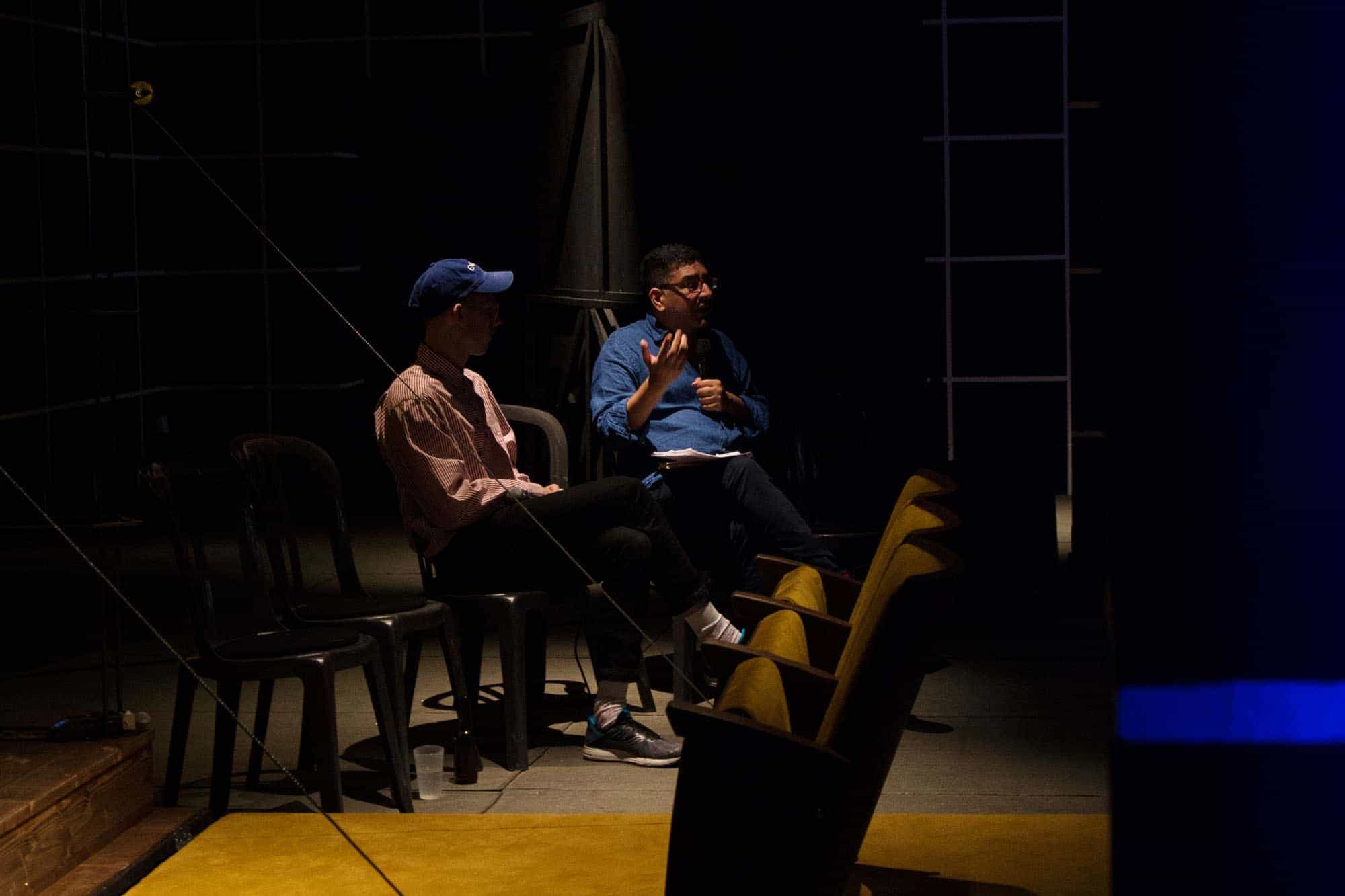
A conversation between Sukhdev Sandhu and Martin Kohout
In this conversation, Sukhdev Sandhu, founding director of the Center for Experimental Humanities at New York University and author of the book Night Haunts: A Journey through the London Night, and artist Martin Kohout, author of the project Night Shifts, discuss their latest vision of nocturnal working conditions and the corner shop as a night-time institution.
Sukhdev Sandhu It’s slightly embarrassing being here. When I was younger, being associated with corner shops was the worst thing you could ever imagine. Many members of my family worked in corner shops, and my biggest fear in life was to work in a corner shop. It was to be downwardly mobile, to be boxed, and segregated – economically, socially, imaginatively - with ‘foreign’ people, people who were regarded as parasites and vermin. Lots of jokes at me, and friends like me, were all through the prism of the corner shop. They were jokes about why Romans used to build straight roads: because they didn’t want Pakis to build corner shops. So you imbibe all this stuff, and you think the corner shop is a blank space, a boring place, a space that is just for people who have failed in life – not anything utopian or anything of interest.
At the same time, I also used to look inside when many of these corner stores were closed at lunchtime. These days lunchtimes become harder and harder to sustain. But corner stores often used to have lunchtimes. I would sneak off from my school and go to various corner stores and look through the windows. There were magazines on the top shelves with people with no clothes on. I thought, that’s great! And there was chocolate, and there were books and all these things, and it felt like a museum, it felt like a playground, it felt like a pleasure dome, it felt like an aspirational space. And so, these two elements combined, corner shops as real spaces entangled with history, with geography, with politics, but also, as kind of weird, dreamy, perverse spaces rich in imagination and longing and your own fucked-up head. And weirdly, while watching the films just now, I had exactly that same feeling about night-time. Night-time as a space which is local, which is very real, which is about labour, exploitation, self-exploitation, technology, and history; but also, maybe because the lights were down, a place that felt very moody and eerie, and dreamy, and ghostlike, not a real space. It’s this dialogue between the real and the unreal, the real and the surreal, which is part of the mystery and magic that comes up when thinking about the night-time.
In many ways, all of this was kind of anticipated by Karl Marx. I didn’t think I would ever say that! Here though is a quote from Das Kapital in 1867, about factory life in the north of England and why more and more employers, industrialists, were trying to make evening shifts compulsory. ‘The prolongation of the working day beyond the limits of the natural day, into the night, only acts as a palliative. It quenches only in a slight degree the vampire thirst for the living blood of labour.’ 1 I love the idea that there is a natural day, and of course, part of what we are talking about here today is a relegation of the category of the natural. I like this idea of a vampire sucking the blood of as many people as it can. In this extract Karl Marx isn’t just talking about women or about men, or boys. He goes on to say: ‘Time for education, for intellectual development, for the fulfilment of social functions, for social intercourse, for the free play of the vital forces of the body and the mind, even the rest time of Sunday, what foolishness! But in its blind and measureless drive, its insatiable appetite for surplus-labour, capital oversteps not only the moral but even the merely physical limits of the working day.’ 2
Now, if you haven’t read Marx, you probably think this is not how he writes. Because this isn’t just political theory, or just economics, or some philosophy; this is science fiction, this is a horror film, and this is speculative fiction. Stephen King couldn’t do better. And there is a kind of excitement in this. The more his prose gets excited and overheated – he’s describing something terrible, unnatural and awful – and you can see he kind of wants it to happen, a little bit. And, in a way, when we talk about night-time, even now when we are complaining about the various conditions and various situations, we want it to be even more dreadful. We want it to be a horror slide show, a place full of ghouls and dreadfulness. And in the 19th century – and before then – books, texts about the night-time were always about horrors, about dreadfulness. It was a kind of gothic show.
My project, which I did a while ago, about night-time, it came from a different place. But it makes more sense now because of the work you’ve all being doing – and us here this evening. My training is in literature, and so I didn’t think with my eyes, I didn’t trust my feelings; I was, in today’s language, not an interdisciplinary person. I’ve written a lot about immigration from the former colonies to the United Kingdom over the last thousand years. I did so through books because that’s what my education had taught me: books were the only meaningful form of archive, the only form of evidence. So you’re always looking at written traces. And increasingly that felt incomplete. I wanted to use my legs, I wanted to use my ears, I wanted to learn to talk to people, I wanted to expose myself to situations and experiences that tested my very conventional, very boring critical abilities.
Many of my colleagues and friends thought I was a bit stupid. I don’t know if you felt this. Because night-time seemed very simplistic. Night-time was a kind of a banal category: it didn’t seem cool, it didn’t seem postmodern, it just seemed like a very old-fashioned word. What is there to say about night-time? Of course, it’s an intersectional term, a global term. It’s something we all experience in different ways, and it has a long lineage. It’s a historical way of analysing life, and analysing cities and experiences. And people write about it in all sorts of ways – often, again, with tension, a schizophrenic tension between fear and dread, and horror. But, for me, I also had a sense that it could be funny. You could have adventures there. You could see all sorts of crazy stuff going on. It’s a place of spectacles and sensations. Why would you be up at two o’clock at night historically? Or even at eleven o’clock or three o’clock? You should be in bed: you’re tired, you’ve been working during the day. The only reason you would be out is if you are a criminal, a prostitute, part of a small tranche of people doing night labour. Otherwise, you are looking for experiences; you are hungry for a form of existence that you cannot get in your daily world. So, it’s very Jekyll and Hyde, very binary.
And I was doing this project while I was living in the East End of London. A place around Brick Lane, which historically is a place of migration – Jewish, Irish, Nigerian, Bangladeshi – and mutating constantly. A place lots of people would never go to; they feel it’s a place of horrors, the place of Jack the Ripper and all those kinds of stories. But by that time, in the early to mid-2000s, it had become the kind of city the government and the Mayor of London were excited about. The nightlife there had been discovered. Night-time: creative industries, people that go to parties, obscure DJs, people wearing eccentric clothes, people drinking. Hopefully like all of you! It was not excessive or peripheral to the economy, but very important. And reading all this literature about it, it seemed to me, as someone who mostly worked on migration and colonialism, night-time was being described in the way that the imperial world was described in the 18th and 19th centuries: a place formerly kind of weird or obscure or barren, but that now could be surveyed, utilised, numbered, extracted, profited from.
I was caught up in this double-bind. Thinking – here I am, wandering around, trying to make sense of it. Thinking – how do you describe night-time? What is the night-time? And thinking – well, what’s the value of my work? Am I making the city, its dynamics, its infrastructure, its architecture, its usages useful to people that I don’t necessarily think of as my friends? I have not resolved that tension. In my mind, I don’t want to ever know any city, I always want to remain confused and ignorant about it. And I never want to know night-time completely: I want to get closer to it, but it always has to escape me, to elude me.
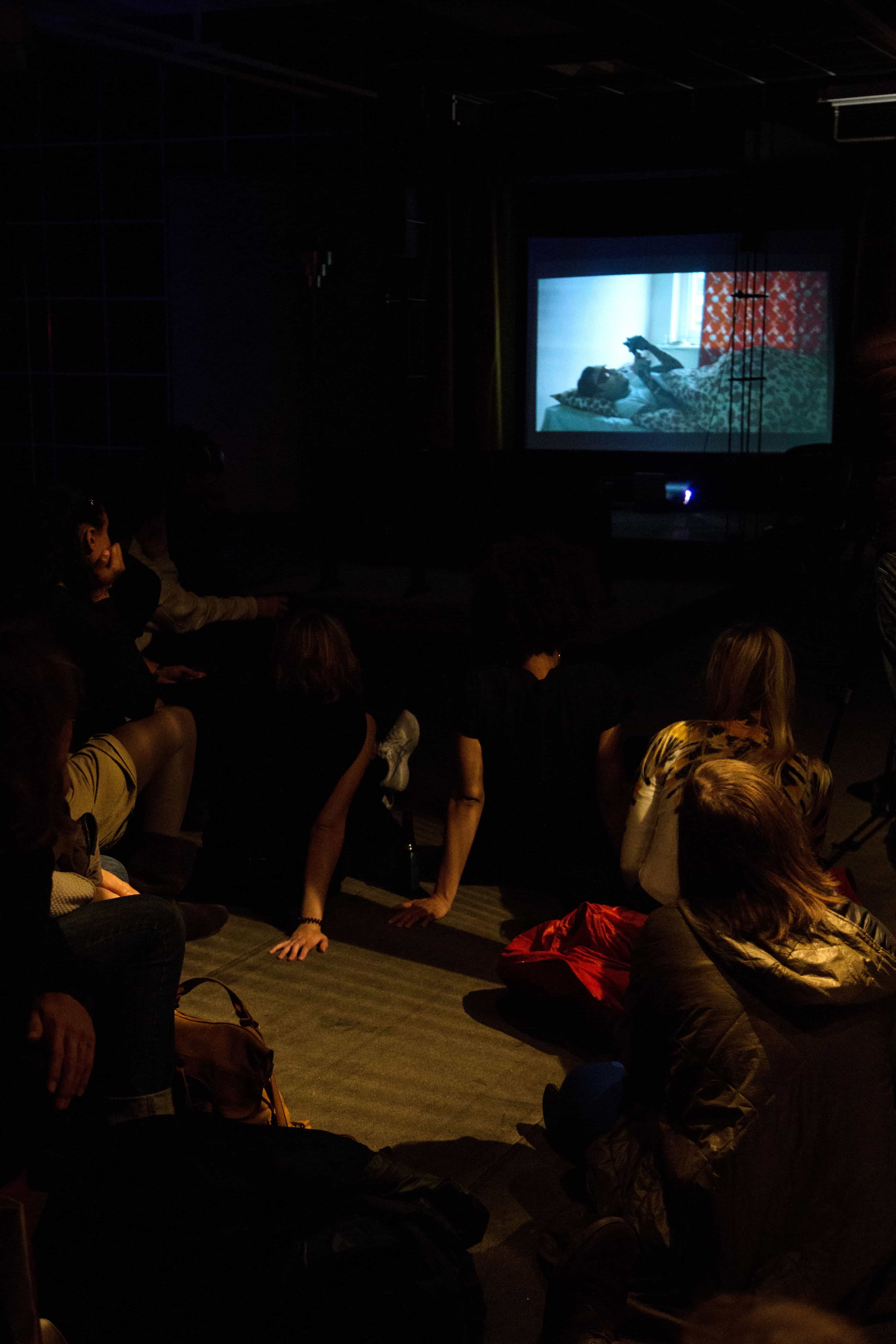
As I was saying, the subcultural economy was being trumpeted by Tony Blair’s New Labour government. Night-time was a way of rebranding London for a younger crowd, a hipper crowd, for an international tourist crowd, the type of people that go to Berlin for the weekend to go to techno clubs, or to a particular restaurant in Milan. I wanted to do something about work because for me living in a supposedly funky area in east London, I was having a great time, I didn’t do much work, so I was very much part of the kind of gentrified crowd. I could get away with it because I wasn’t white, so people thought I wasn’t a “gentrifier”, but I was. And around me all the time I realised there was a shadow to my happiness, and it was the people who enable all the things I took for granted. It was the long tail, the long shadow, the deep wiring of the night economy. I lived in a building that, every night, roughly at about midnight, homeless people would break into, because somehow, they had found keys or created keys to maybe about 200 buildings in the area. So, they would get their keys, go in, and there were about three very big garbage bins, which they used to sleep inside, and then they would disappear again at five o’clock in the morning. And they were separated from where I slept, on the ground floor, by a wall. I like to think of myself as alert, I like to think of myself as socially conscious, but it took me years to find this out. Right next to me, a couple of yards, were these people with a different map of the city, tactics, improvisational skills, desperation, which meant they were sleeping in garbage bins right next to me. And that made me feel stupid – and that I had to do more work to begin to understand the night.
I did this through focusing on labour. I wanted to understand different kinds of labour. I went on police helicopters that surveyed the streets, I went with people that pray all night, I went to people who get rid of ghosts or try to get rid of ghosts, people who sell their bodies, people who sell sex, people who shoot foxes, people who work down the river, night cleaners. I didn’t do the kind of work or some of the type of work that you’re doing, which is about interior space. My project was also pre-broadband. I still remember the sound of that time: there was dial-up, ping ping ping, you're trying to connect. The speed with which you could get information, data, deal with clients, deal with friends, play computer games together around the world – or have poor Filipino kids play themselves to death so you could get to another level of your computer game. All that super-fast stuff wasn’t quite there – even YouTube had a limit of ten minutes per item.
But I was writing during the night very often. I was getting back from my explorations, interviews, and adventures, and typing away. And sometimes, I would also pay bills and email various people. I knew many other people were also awake, so I think I was living through the period where what seemed exterior, physically in terms of labour, in terms of work, in terms of your psychology, exhaustion, exploitation, was becoming increasingly domesticated. There’s not much of a gulf between there and here, whoever the night is out there and you in here: we were all in it together in a complicated way. And that pressure has accelerated incredibly over the years. I only got a “smart” phone about a year and a half ago. It seems very late, I remember thinking: why do people have mobile phones, what do they need them for? Now I sleep with my mobile phone under my pillow. I think it's stealing my dreams. I believe it’s sending frequencies into my head which are evil. And when I wake up every two hours, I immediately go look at my emails to tell me about all the work I haven’t done, and then I go and find out that whatever sports team that I’m interested in has lost. I wake up and, almost every morning this year, someone that I like, a musician, a filmmaker, an artist has died. So I wake up to reach under the pillow, and my morning begins for me with death, and then I stay in bed, sometimes just crying or just howling. Then, of course, I start writing to all my friends, putting up on social media, ‘He’s dead, she’s dead!’, and what's going to become of us, this is terrible. So I’ve become a media operator. I’ve become part of this sort of transnational wiring. And this information that even ten years ago, let alone twenty, thirty years ago, I wouldn’t have known about for days, maybe for weeks, possibly for months, I know now; it’s there in my space, it interacts, it is choreographed with my bedroom, my building, the rhythms of the day. And then I go to the shower! I don’t know what kind of phase of life this is – of capitalism, of urbanism, of technology. Jodi Dean calls it communitive capitalism. All I know is that I’m making, along with all of us, a lot of money for a lot of people who are not my friends. So, if this is a deal, if this is a financial interaction, it feels overloaded. What am I getting out of it? I mostly feel more depressed then I ever felt before. I feel very sluggish.
I live in a building with students, in the building where Def Jam records, founded by Rick Rubin and bringing out records by LL Cool J and the Beastie Boys, was founded. I’m often up late, and the corridor which I live in is filled with students: they are there at three o’clock in the morning, in pyjamas with their earphones on, because they hate the people they are sharing their tiny rooms with. They are doing assignments for class, and they will have to be in class at nine o’clock or even eight o’clock in the morning. This is, for me, not an education. For me, this is not any kind of life. This is not any kind of night. They are doing this at the age of eighteen, nineteen – training and abusing themselves to become the sort of people that they feel the economy requires. Because they are also trying to do internships, trying to get a foot into whatever professions they feel they must. So I look around, and this came through to me in different aspects, both in the slides and in your film, Martin, that night isn’t just a place, it’s not only time; it’s about a collective agreement or collective collusion about what kind of world we want to live in.
I think some of you have been reading people like Jonathan Crary 3 and his writing about 24/7ism. To an extent, what has been described as a pandemic in mental health issues in the United States – well, one of the things that is creating this kind of group psychology – is technology and its impact upon the night. The disappearance of the night, the malformation of the night. And so, that old category – day versus night – no longer works. You wake up (if you wake up), and you’re sort of a zombie – you’re not really alert, not really there, then you spend most of your time on your phone dealing with people all around the place. Where are they? Where are you? We barely know how to describe all this stuff. Yet what to do about it? Is it legislation?
There are companies in France – for instance, Volkswagen has tried to make it okay for employees not to have to deal with email after 5 pm or not to have an obligation to interact with employers during the weekend. Is that a solution? I don’t know. In a sense, collectively, where we are now economically, in time and history, we are a laboratory for the transformation of existence in the Global North – and maybe everywhere. And so, Karl Marx’s ideas or his speculations seem really resonant. What he regarded as incredibly extreme, the terrible lives of this subordinated group, a barely-living proletariat: it seems not a million miles away from what a lot of us live. We are all, if you buy that argument, we are all the proletariat, and we are all being abused, and we are all being exploited by the vampiric greed of capital, and it’s almost a self-fulfilling need to get ever more avaricious. So that’s kind of a cheerful challenge that faced me!
In terms of methodology, I spent a lot of time thinking about sound, what kinds of sounds you hear at night. People living in smaller and smaller apartments, on other people’s sofas, being terrorised by refrigerator noise or by a drop drop drop drop or by central heating. There are people, serious scientists, who feel that still to be computed is the psychological damage being done by these banal microscopic sounds that more of us are being exposed to. It’s a kind of dark ambient. I was very aware of something that is becoming a more prominent topic: sonic nature. For instance, birds you would expect to hear at five o’clock in the morning. Suddenly you listen to them at three o’clock because the areas where they sleep or settle are being changed due to the development of new parking or transport arrangements. On the one hand, everybody wants to have quiet at night, but too quiet and thickly-glazed windows are also problems; you can’t hear what’s going on outside, you feel imprisoned from the sonic world, the auditory citizenship of the city at night. And I also spent a lot of time thinking about smell. I remember jumping up and down on dead rabbits so we could take the guts of the rabbit out to feed to foxes.
I remember spending time in corner shops and taxis. The two scariest places that I spent time in were not exciting places; they were a taxi and a corner shop. The shop was a bit like this building. It had a basement where people were gambling, studying, communicating with families in different countries. It had lots of cameras linked to the shop above. It was a place literally on the street corner. You would have local gangs, of twelve- or thirteen-year-olds, routinely going in at two o’clock almost like an invading army, and saying, ‘Give me that, give me that’, and then taking out knives and stabbing, shouting. We could see downstairs that our co-workers, our friends, our relatives were being attacked. And sometimes the guys would go up to help, but sometimes too they knew that there weren’t enough of them. And even though they would press the panic button or call the police, the police would always arrive too late. The corner shop was multi-camera’d and surveyed, but the cameras weren`t protecting them. It was a horrible place.
With taxi drivers there was a division between black cabs, which had partitions, and private cabs, which didn’t. Passengers would say, I don’t have money, I’m not going to pay, what are you going to do about it. And often they’d run out, or get knives. Sometimes drivers would show me their backs or their necks, and they looked like a war-map of scars and scabs. So there you had night experience at a very microscopic level, coming up as a sort of muscle memory.
Josephine Devaud Speaking of taxi drivers, it makes me think of Martin’s project, Night Shifts, and I was wondering if, Martin, you want to comment, either on the work or on what was being referenced here?
Martin Kohout I think there is a lot to take in. But one of the things I was thinking about from the very beginning, during the introduction, someone said, we think about these big cities, one of them being London, like cities that live non-stop, around the clock, twenty-four-seven. But what I find interesting in London, which is a reminder of how romantic this idea is, if you walk outside in London at midnight, you don’t really see that much light, you don’t really see places open, you don’t really see people moving around. You see it in Berlin, but it’s the people going there for entertainment. I think there is this big difference between the daytime and the night-time, in the sense that, during the time I was making my project in London, every eighth Londoner was working a night shift. When you are moving through the daytime, you think you have a visual idea of people at work. You see them all around you. But if you work at night, most of this work is concealed from sight, hidden from street level, or it's not even in the city, what would be considered the city, it’s outside, it’s continually moving, transportation and so on.
When I started this project, I wanted to make a documentary film, not the fiction film you saw just now, and the reason why I didn’t do a documentary film, in the end, had nothing to do with the night. It has to do with managers and realising they wouldn’t be very enthusiastic and I would not be allowed to go shoot in specific locations. Still, one of the interesting things I realised was how I was expected to see this labour, how I was expecting to see this labour, by just going out for a stroll. Which is what I liked about your book because you would go to those people directly, which I did at the end as well by doing interviews, but I was not with them at their workplace, I was inviting them to talk to me. I feel like one of the most important things about people who work at night, or about the idea of night, is the loneliness and isolation that you understand is a big part of it. Because even if you are in a workplace where you are not working alone – as many of the jobs take place in huge spaces doing whatever task on your own – you are still working under such conditions that you don’t have much interaction with your colleagues. It’s very isolating. And when you come home, you try to sleep during the daytime, when it’s hot, loud, bright. You are completely sleep-deprived all the time, and when you have an overlapping window, most of your family and friends are at work, so again you are isolated. And for me, this is one of the enormous differences that I think people who don’t have the experience of working at night don’t understand. So when we lead people like us into the night as a space, we often think about it more like a boundless space, where the rules are blurred. Loneliness is really connected with being social, but working at night is almost the opposite in most cases.
Considering the qualities we’ve been talking about concerning the night, I feel like, when you are working the night shift, they are connected to exhaustion. You shift into a different state, especially after a few night shifts, where people are just functioning semi-automatically but can't enjoy or analyse much and so on. It becomes blurred, endless nights, because during the daytime you can see the shadows and you can see the sun shifting. During the night all these things are pretty much the same. This is one of the things I was interested in for a long time because it’s a universal organic quality of humans and other creatures that is very much in contrast with what we expect of machines. Machines can work around the clock with very much the same productivity, and so on; their productivity is kind of flat. Yet organic organisms have cyclical or metabolic rhythms, they have peaks, and they have lows, and that’s continually alternating back and forth. A lot of the work being done at night nowadays, especially with the information and economic shift affecting all of this, has become some sort of push to align people with the productive economic pace. The exhaustive work to be as productive as possible, which is precisely what Jonathan Crary mentions in his book. But I wanted to kind of prove that the moment when we hit the wall, the limit – and it's obvious it’s going this way, it’s impossible not to – it’s what also makes us human. But just changing around your sleeping pattern is not going to solve your sleep deprivation or insomnia.
Sukhdev Sandhu While you were doing your work, you were probably reading a lot of the increasing Silicon Valley literature on sleep. Sleep is big business. It’s big money these days. You have the Arianna Huffingtons investing in this. There’s increasingly the idea that if you get the right software, if you get the right app, if you pay 500 euros for the right kind of blanket, then many of your problems can be solved. And it's not the answer! If it’s even true at the individual level! This is a silly kind of privatisation. It’s inadequate from a broader, structural analysis. Finally, people are beginning to understand sleeplessness as an essential way of understanding society, but the Silicon Valley types are not actually going to the root of the problem; they are just trying to deal with it in a very silly, over-economised way.
Martin Kohout This also reminds me, it’s not in the book, but one of the things that the co-editor of this book and I were discussing was this interview with the CEO of Netflix. They asked him, so, what’s your next step to grow, who is the competitor you have to beat, is it Amazon Prime or these other services that pretty much offer a similar product? And the guy said, no, it’s sleep. The thing we must fight against now is how many hours can we have the viewer’s eyeballs with us. Of course, the limit is the amount of time people spend on necessary things that are taking them away from the screen. Not the other companies producing similar content.
Sukhdev Sandhu Yeah, if I watched a programme five years ago and I liked it, I’d have to wait. I’d have to wait a week for the next episode. And now increasingly I watch more and more, all in one go, until 2 o’clock or 3 o’clock into the night. But I also want to argue kind of against you, and against myself, about the mobile phone: it makes a difference if we think about the archive of the night. At first, in my project, I thought I was talking to people, and I thought maybe I was giving people a voice through my research, and maybe shining a spotlight. But increasingly that seemed kind of patronising to me because they were recording their lives, they were filming, in conversations with people in different countries, they were hacking systems, playing music. And oftentimes, I don’t know if any of you saw that exhibition a couple of years ago, of photographs taken from inside refugee camps, of people who managed to get to Europe from North Africa or the Middle East. The public images spread about were those of people nearly drowning or drowning, people looking terrible, but an artist-photographer had managed to hack into the images that some of those people living in charity camps had produced of their lives. So instead of looking at pictures of the camps and of the beach, we were looking inside. And what we were seeing was people masturbating, people talking, singing songs to their families, or making funny jokes and you had a sort of different dimension. Something that looked uniformly awful and terrible from the outside but was a bit more complex, a tribute to people’s improvisation and ability to deal with complex situations. And it struck me that for anybody writing, or making, or thinking about night-time, there is the challenge. It’s understandable if we foreground darkness, difficulty, desperation, but that’s not the whole story. And some people love working at night time because they feel that they are freer, it’s in their own space, they do feel a bit less inhibited, and it all comes to show how people are not just victims of their situations, and of their jobs, and their livelihoods.
Martin Kohout I agree, but from the interviews that I did – I did about ten on camera, and I decided I would edit about four of them, I wanted to have the whole spectrum, I wanted to have people who talked about it positively – but what I find funny is that those people who talk about it positively in the video, and they weren’t the only ones, they really like working the night shift because they don’t like to be around too many people. So basically, they like it because no one is bothering them. From the research that I read, and people I talked to, you often have young people working at night, because physiologically and metabolically, they are better able to deal with these conditions. And often it’s their side job, and they can use this time to study, or they like to have quiet time, depending on what the situation is. Some of the positions allow you to just sit somewhere and keep an eye on the place, that it is safe. In the first interview in the documentary, he’s very young, and he thinks it's great, amazing, but his portrayal of it, and I like him a lot, is self-deceptive. There is this moment where he is talking about, ‘When I come to work I read all these messages on WhatsApp groups I’m part of, hundreds of messages people wrote during the night-time, then I read them and see what they are talking about, and that’s my life’. And you’re like, wait a second, how can this be your life, when you are not participating in it, you are reading about the life of other people.
In a way, most of the people interviewed started on the night shift thinking it would last for a few months. Then they realised they had been there for a few years because most of the time these jobs are better paid, and they had some personal reasons for taking it, but very few of them were really very into it. Recently I was listening to an NPR podcast, I think it’s the last episode of This American Life, about one specific café, and the journalist spends 24 hours there interviewing people who come in. There is one waitress who has been working there for nearly 20 years, doing the night shift, and she loves it. She says, ‘You know this place at night is a community, it’s a specific atmosphere, it’s a different kind of interaction you get here. And this is my family, why would I want to change my job if I love what’s happening here at this particular time of the day, these particular people who repeatedly come here, or the people that come once after partying’. And, I was like, ok, she really does love her job, it makes sense. But a lot of the time, I think the problem is that – or of course, when I play devil's advocate – most of the people who work night shifts are not aware of the medical issues they will face later in life. The same goes for most of us here, we don’t really know how bad it is if you sleep less than eight hours a day, which even though I know I don’t sleep eight hours a day, it’s really bad, there are a lot of research papers out there about it. These things are somehow not spoken about, especially when you start working a night shift job. I’m sure some people work in finance jobs during the night-time, and they know all of this. The managers will very rarely provide people with extra health care benefits, they will not really tell them that they should probably be taking some vitamins and all these things. In the film, the characters are wearing these orange glasses when they want to fall asleep or blue lenses when they need to stay awake, which is a proven condition among night workers. Most people don’t know it, and most people only start realising that something is going wrong when they already have health issues. There is also this problem that, maybe if you ask someone who has been working the night shift for three months, they will say it’s great. Because they are really well paid, it's quiet, and so on, but they just don’t understand that their chances of getting diabetes have already risen in the first two weeks of doing the job, so massively that if you told them, they would probably not take that job. I know what you mean, but it's not so black and white. I spoke with people working at Tesco, where they said the managers are trying to cut costs, so basically, they have so little light in the space where they have to restock that they cannot read the labels and don’t really know where to put stuff. And then you realise that there is no way you would be happy working in these kinds of conditions, you just understand that you are not really taken care of, it’s not a place to enjoy, you know.
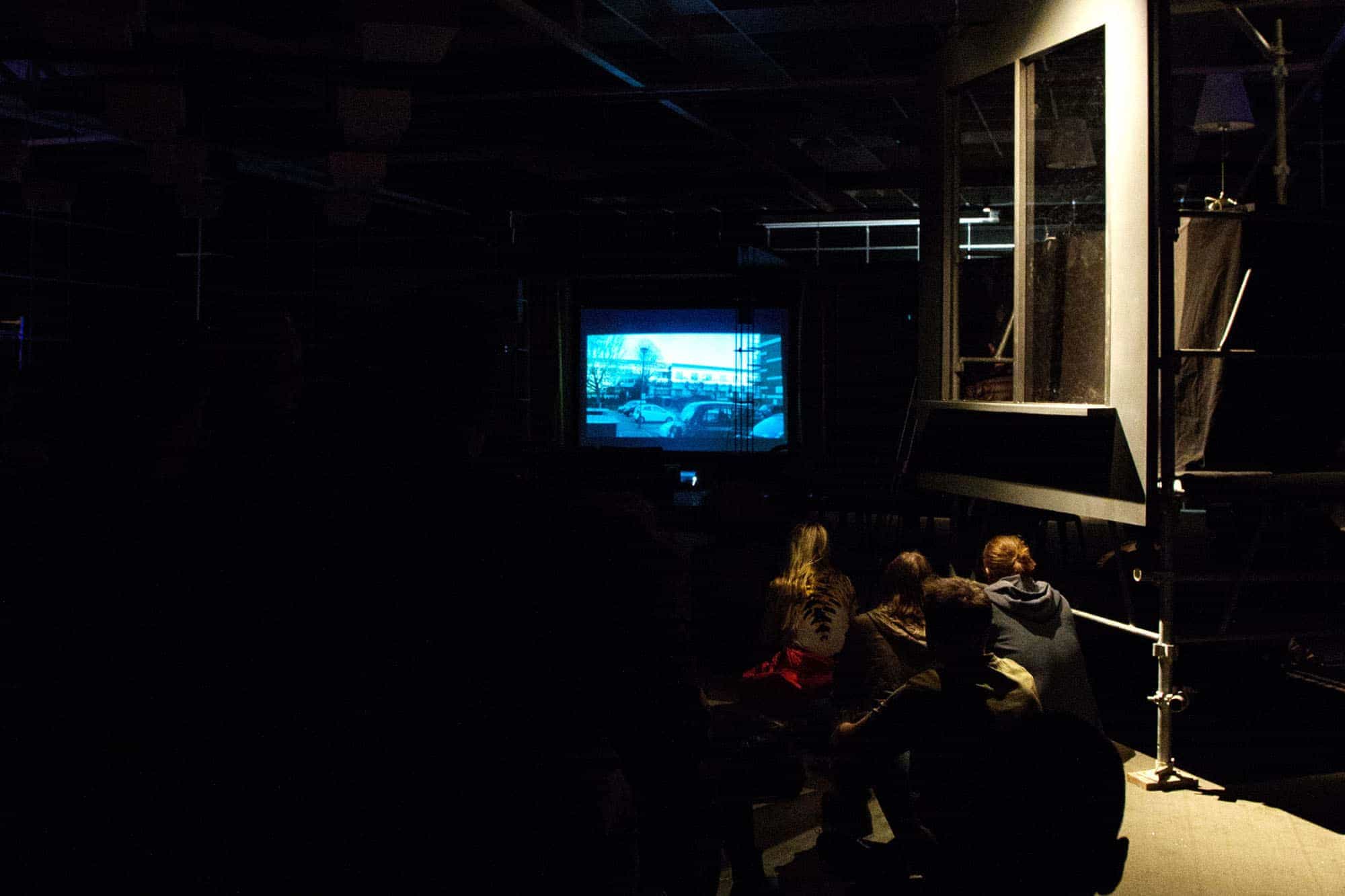
Sukhdev Sandhu I’m interested in hearing from you (public), if you have responses or questions, because, when I was younger, I hated the night and I wanted to work in a world that was basically 24/7. I hated my parents’ world because they went to work at 7 or 8 in the morning and they would come back at 5 pm. I felt if you were a creative person who liked art or architecture and all these things, wouldn’t it be wonderful if there was no difference between night and day, and you were always “on” because you’re so creative and you’re with creative people. I don’t know if people feel like that – or if the ways we have been describing how we experience the night or think about the relationship between work and feeling – and living – is that recognisable? Or are we just aliens?
Martin Kohout I guess, also, something I mentioned before, you don’t, most people don’t see it, you said it as well earlier, we take for granted the fruits of night shift labour. I mean people understand, in the morning when you walk down the street and it’s clean, you know someone cleaned it, but you don’t really give too much thought about when they cleaned it, what kind of lifestyle they have to be able to do this, and so on and so on. One of the reasons I wanted to do a project focused on the night shift, which was the series of two-three films, is because I felt it was, to an extent, invisible to the rest of the population. If you realised that one out of every eight people is working the night-time, you might go down the street in London, and you can feel it, you just had no idea. And like in your book, it’s quite nice because there are all these stories, this is everywhere, and it’s invisible. And that kind of realisation that there is this city at night around you, but it’s on the other side of where you are living, also felt very interesting to me. This kind of, when I’m awake there is this other city that is asleep, and when I go to sleep, this city wakes up, it's kind of what we know from vampire movies and so on.
Sukhdev Sandhu One of the reactions I had to my book was several women saying this is what being a mother is like. We are sleep disrupted constantly, we are exhausted, we have jobs and have to work outside the house. And nobody thinks this is a big deal, because this is maternity, or this is what being a caregiver is about. But if we go back to a sort of semi-forgotten element of radical seventies politics, which is wages for homework, wages and support for mothers and housewives, then we would look at this issue very differently. Caregivers, mothers, to a lesser extent perhaps fathers, have had to deal with fractured circadian rhythms and the long-term implications of that throughout history.
Javier F. Contreras We realise there is a disruption in the way we use daytime and night-time, which is gradual, and we are going more and more in that direction. From the outside it seems like it’s mostly associated with individuals, with adults. My question is: do you think the people who are preserving a circadian rhythm in Western societies, in urban societies, are the kids? Because these are the people who are still living according to a circadian rhythm. If there were no kids, do you think the distinction between day and night would still exist?
Sukhdev Sandhu I think that’s a brilliant question. I haven’t read enough studies about night-time on children, but I know many people take sleep most seriously when it comes to children. Because they’re part of themselves. Of course, you fight really hard to protect the child: you have an idea of what is normal, what is ethical, what is a proper investment in the development of that child. You protect that child with your life. So, yeah, the child is maybe the last category of people for whom sleep is taken seriously. And it gets increasingly worrying as more and more teenagers and early teenagers these days go to schools where there is more compulsory testing. And nice bourgeois parents worry about that and give them extra classes and say work a bit harder, do more homework. They are probably losing sleep as well because of their parents' anxiety about the future. So I don’t think even they are exempt.
Martin Kohout Yes, to me it brings to mind a few things, one is that traditionally schools would often start at 7:30 in the morning. And for some years, since these questions were brought into a broader discussion, people have started coming out with studies about metabolism. Teenagers are just not able to be that sharp at that hour of the day. For physiological reasons they should start going to school at nine o’clock if you want them to learn stuff and do well in tests and so on. So again, it’s hard, we are looking at our future potential. Because the kids are about to grow into something, so we want to shape them in the right way, we care about their patterns, but as a parent, maybe I have to take an extra job so my kid can go to university, so I will not sleep. The first person I interviewed, who is not in the documentary, was this guy who, halfway through the interview, I thought, I should not do this project because I will never be able to communicate this experience. He told me, well, during the daytime I am a manager in a company, I have a white-collar job. When I finish at five o’clock I go home and eat dinner and go to sleep for an hour, wake up, take a shower, and go clean virgin trains through the night. And I was like, this is crazy. He’s been doing it for three years because he needed to pay a debt and take care of his child.
Yes, I feel that in that sense most people’s habits change when they have a child, people often become, if they can afford it, more health-oriented or more health aware. But then I was also thinking about how the problem with the night shift is often compared with jet lag, and people are saying, if we can deal with jet lag, then why can't we find a solution to deal with the night shift. The problem is that when you are flying somewhere for a holiday, or you travel for work, you come to an environment that is shifted a given number of hours from where you came from, but everything in that environment is following the same rhythm, so you just join that. Our bodies can adapt one hour per day, so if you go somewhere with a five-hour difference, after five days or a week, you will be fine, you will have adapted, everyone around you is following the same rhythm. And then you have the night shift job, maybe you work four days on, two days off, four days on, two days off, so for the four days everybody is in opposite rhythms, then you have two days free, and you have the choice to try to push yourself, stay awake longer, align to the other rhythm, or keep your own rhythm. But who will do that. You have two days off, you don’t want to sleep throughout the day and be awake at night when your family is sleeping. Nothing is happening outside, you have nothing to do, and if you were like, well, this is the best thing I can do for my body, then people would have fewer health issues. People would have fewer physiological problems with working nights, but they would have way more mental, psychological, and social deficits. If you look at places that have totally dark winters, very far north, and so on, they don’t really have a circadian rhythm in a classical way. Because there might be no sunshine for some time, but everyone is following this same rhythm, everyone keeps waking up, and the job starts at the same time, so it’s almost like a social agreement in that sense. And then there’s the question you are posing, which I think is very beautiful too: on what do we base the rhythm that we have agreed on. And that’s maybe something that is crumbling a bit. Because possibly there will be a time when schools will offer different schedules for different parents in various circumstances, I don’t know. And maybe education will shift more into homes and be computerised. Suddenly there won’t be such a need to stick to the same schedule for everyone involved.
So, the film you saw first, you can't see it anywhere on the internet yet, it will be online at some point. But this film called Working Nights, you can always find it on YouTube and watch it for yourself. I think the first ten minutes describe well from experience what we are trying to speak of as observers. And I also have to say I’m very impressed with your exhibition, it's great, I think you did an amazing job. Congratulations to you. It’s an honour to be a part of it, and I would love to be here for the other four nights, which is not possible, but I will think about it.
Audience Thank you for the very nice anecdotes and stories, and your argument about the Marxist way in which we use our energy at night. My question is, is there an open war against sleep time? I see many documentaries on YouTube of people trying to teach you how to stop sleeping. I learned that Albert Einstein slept like 11 hours a day, and with this, he could think very deeply, but Napoleon slept only four hours, and he was very efficient. I was wondering if there is a connection with the economy trying to steal our sleep and make us more productive.
Sukhdev Sandhu I think there are at least two things going on. There is a line of thinking that says sleeping and proper sleeping is for the true aristocracy of our period. So proper sleeping is only for the rich, and people who can organise their lives, or who have the power. But then, you get people like Margaret Thatcher and now Donald Trump, who makes a significant point of saying, ‘I'm not like those other loser leaders; I only sleep four hours a day, and even then I’m mostly watching Fox News’. And there is a gender aspect to this, it's unmanly, you’re not tough, you’re not really even meant to be thinking about sleep because if you’re a real alpha man or alpha person or a real leader, then you just conquer the night and you conquer sleep.
Martin Kohout At the same time – I can send the research paper to someone from the team – a friend of mine who is a neuroscientist did this research into how to extract labour from us while we are asleep. Of course, there is also the tendency to figure that, maybe when the body is asleep, we can do something with it. We can do very simple decision making and fulfil straightforward decision-making tasks even though we are unconscious, asleep. So this friend of mine said to me, maybe once people figure out that you cannot do less than four hours a night, then at least for the four hours you know you are plugged into this, and when you wake up you have generated information or energy or whatever it is. So, in these videos, what they are describing and what we have been discussing, it’s a very Silicon Valley kind of idea. It’s like, when do you have fun. When is your life about something else? Which is kind of this Bifo Berardi idea, if to be wealthy means to have time, not necessarily money, if you’re super rich, but you are only doing your job, maybe you’re happy, but for me, that’s not what I would think of as great quality of life.
Sukhdev Sandhu I imagine this is a grey area for anyone who wants to become a billionaire or a trillionaire. When I’m asleep, basically, you power me. So, when I’m in bed and asleep, you can go jack me up to one hundred percent and maximise me, so I’m ready to go whenever I wake up. Basically, to blur the boundary between the human and the non-human, the human and technology. I would imagine many people are already looking into doing this.
Martin Kohout is an artist based in Berlin. He is the winner of the Jindřich Chalupecký 2017 Award and a driving force on the international contemporary art scene. His work focuses on the various aspects of technology and the place of man at the heart of current societal conflicts linked to individualism, communication and globalisation. In 2018 the Daylight Management exhibition, the first event of the Night Shifts project, took place in the Auto Italia space in London, led by a community of artists, researchers, scientists and night workers. With his Slides project, Kohout explores the consequences of night work on health and human relations in relation to current technologies.
Sukhdev Sandhu is Director of the Centre for Experimental Humanities at New York University (NYU), Associate Professor of English and Social and Cultural Analysis and author of the books London Calling: How Black and Asian Writers Imagined a City, I'll Get My Coat and Night Haunts: A Journey through the London Night. An award-winning author and former chief critic for The Daily Telegraph, he writes for publications such as Sight & Sound, the London Review of Books, magazines such as The Wire and Frieze, and The Guardian.
